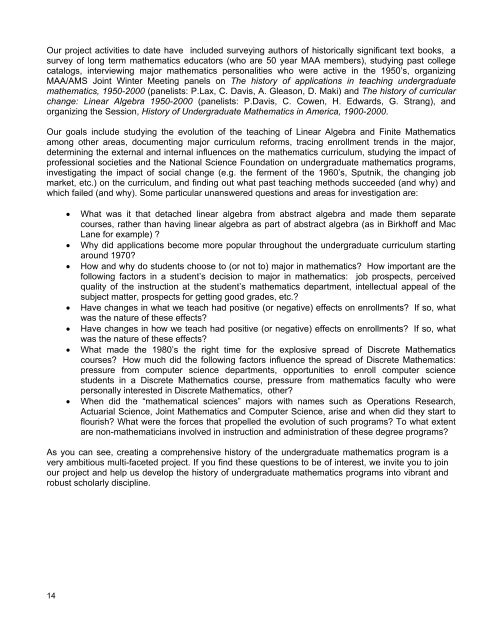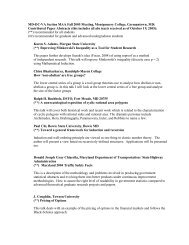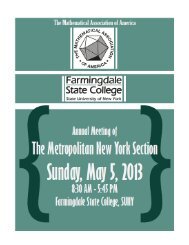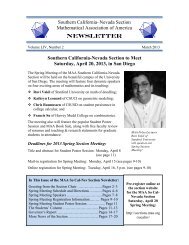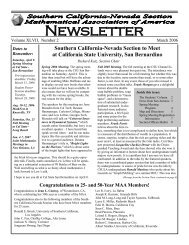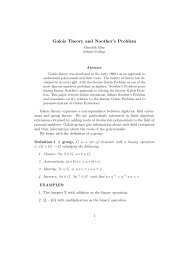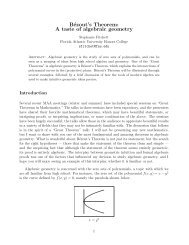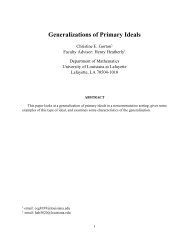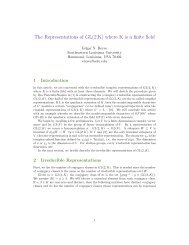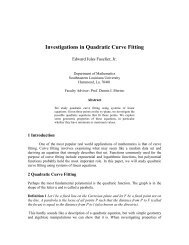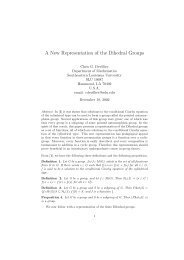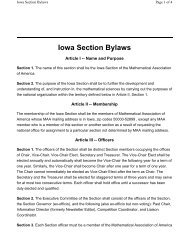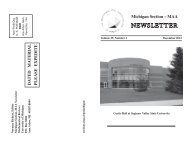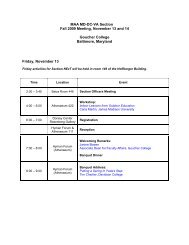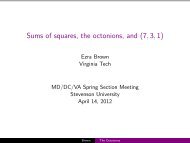2005 Newsletter - MAA Sections - Mathematical Association of ...
2005 Newsletter - MAA Sections - Mathematical Association of ...
2005 Newsletter - MAA Sections - Mathematical Association of ...
You also want an ePaper? Increase the reach of your titles
YUMPU automatically turns print PDFs into web optimized ePapers that Google loves.
Our project activities to date have included surveying authors <strong>of</strong> historically significant text books, a<br />
survey <strong>of</strong> long term mathematics educators (who are 50 year <strong>MAA</strong> members), studying past college<br />
catalogs, interviewing major mathematics personalities who were active in the 1950’s, organizing<br />
<strong>MAA</strong>/AMS Joint Winter Meeting panels on The history <strong>of</strong> applications in teaching undergraduate<br />
mathematics, 1950-2000 (panelists: P.Lax, C. Davis, A. Gleason, D. Maki) and The history <strong>of</strong> curricular<br />
change: Linear Algebra 1950-2000 (panelists: P.Davis, C. Cowen, H. Edwards, G. Strang), and<br />
organizing the Session, History <strong>of</strong> Undergraduate Mathematics in America, 1900-2000.<br />
Our goals include studying the evolution <strong>of</strong> the teaching <strong>of</strong> Linear Algebra and Finite Mathematics<br />
among other areas, documenting major curriculum reforms, tracing enrollment trends in the major,<br />
determining the external and internal influences on the mathematics curriculum, studying the impact <strong>of</strong><br />
pr<strong>of</strong>essional societies and the National Science Foundation on undergraduate mathematics programs,<br />
investigating the impact <strong>of</strong> social change (e.g. the ferment <strong>of</strong> the 1960’s, Sputnik, the changing job<br />
market, etc.) on the curriculum, and finding out what past teaching methods succeeded (and why) and<br />
which failed (and why). Some particular unanswered questions and areas for investigation are:<br />
• What was it that detached linear algebra from abstract algebra and made them separate<br />
courses, rather than having linear algebra as part <strong>of</strong> abstract algebra (as in Birkh<strong>of</strong>f and Mac<br />
Lane for example) <br />
• Why did applications become more popular throughout the undergraduate curriculum starting<br />
around 1970<br />
• How and why do students choose to (or not to) major in mathematics How important are the<br />
following factors in a student’s decision to major in mathematics: job prospects, perceived<br />
quality <strong>of</strong> the instruction at the student’s mathematics department, intellectual appeal <strong>of</strong> the<br />
subject matter, prospects for getting good grades, etc.<br />
• Have changes in what we teach had positive (or negative) effects on enrollments If so, what<br />
was the nature <strong>of</strong> these effects<br />
• Have changes in how we teach had positive (or negative) effects on enrollments If so, what<br />
was the nature <strong>of</strong> these effects<br />
• What made the 1980’s the right time for the explosive spread <strong>of</strong> Discrete Mathematics<br />
courses How much did the following factors influence the spread <strong>of</strong> Discrete Mathematics:<br />
pressure from computer science departments, opportunities to enroll computer science<br />
students in a Discrete Mathematics course, pressure from mathematics faculty who were<br />
personally interested in Discrete Mathematics, other<br />
• When did the “mathematical sciences” majors with names such as Operations Research,<br />
Actuarial Science, Joint Mathematics and Computer Science, arise and when did they start to<br />
flourish What were the forces that propelled the evolution <strong>of</strong> such programs To what extent<br />
are non-mathematicians involved in instruction and administration <strong>of</strong> these degree programs<br />
As you can see, creating a comprehensive history <strong>of</strong> the undergraduate mathematics program is a<br />
very ambitious multi-faceted project. If you find these questions to be <strong>of</strong> interest, we invite you to join<br />
our project and help us develop the history <strong>of</strong> undergraduate mathematics programs into vibrant and<br />
robust scholarly discipline.<br />
14


